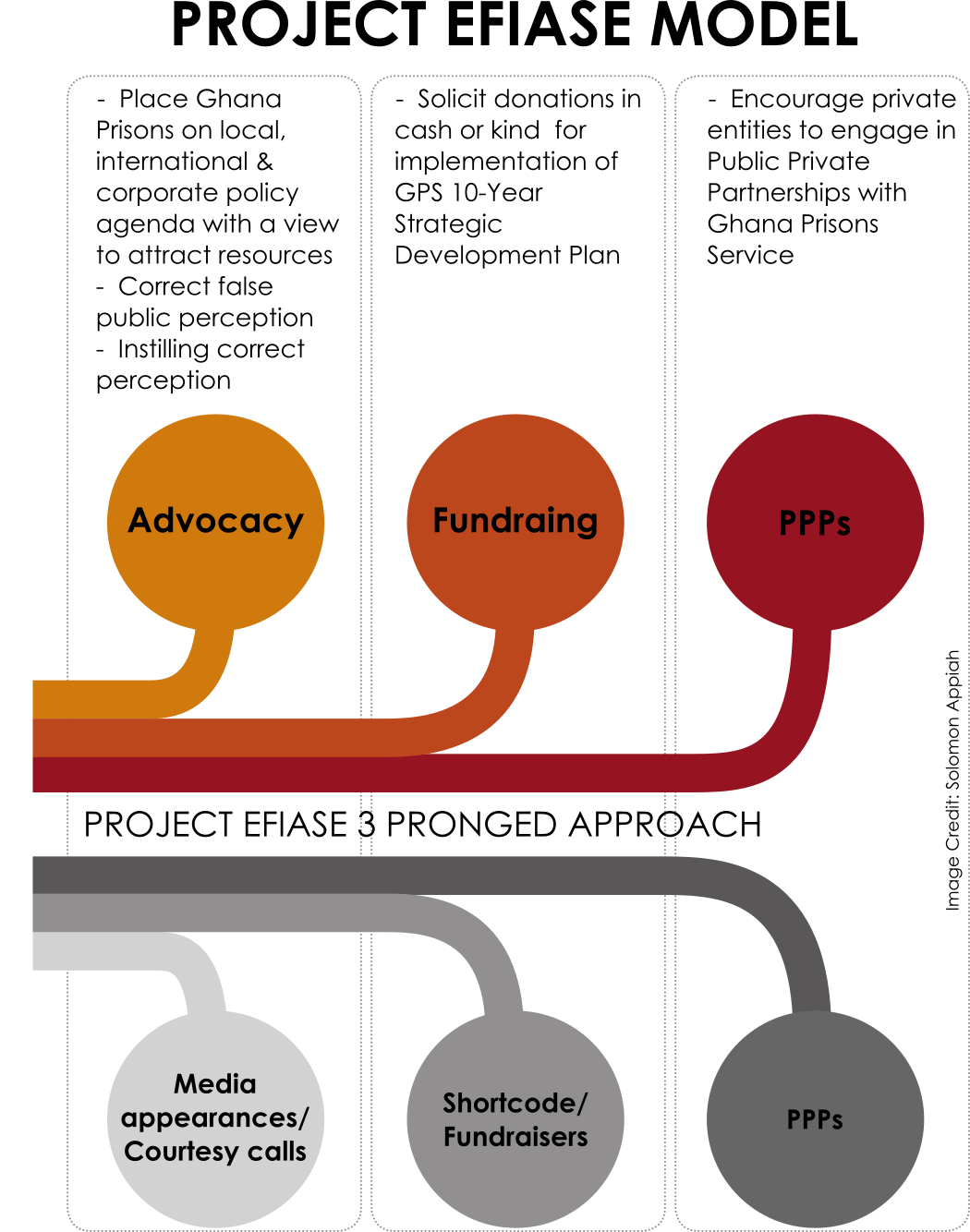Originally posted on July 5, 2015 by Solomon Appiah
By Solomon Appiah
Member, 6th Prisons Council
Chairman, Project Efiase Planning Committee
Twitter: @s_apiah
Efiase is the Akan word for Prison. Project Efiase is about bringing transformation to Ghana’s Prisons Service, educating the public about the current state of its prisons and sensitize the public about the importance of the Prisons Service to public safety. It is also about advocating to corporate entities that the Prisons Service is open to business via public Private Partnerships. Finally, Project Efiase is a fundraiser. All the above is needed to initiate transformation. It costs money to rehabilitate people so that when the re-enter society, they do not endanger public safety. I designed the infographic below to explain what Project Efiase seeks to accomplish:

According to a June 2001 U.S. Department of Justice paper by Michael E. Smith via the National Institute of Justice, “public safety is best conceived as the condition of a place, at times when people in that place are justified in feeling free of threat to their persons and property.” Public safety is threatened when a society cannot adequately treat its offenders and they are released back into society worse than they entered the prisons. Treatment here is with regards to reformation and rehabilitation.
As part of the nation’s Criminal Justice System, the role of a well functioning Prisons Service in the maintenance of public safety cannot be over-emphasized. The Service does not only take safe custody of convicted persons but also persons awaiting trial—some of these having to spend multiple years on remand. By the time some of these have been released they have picked up negative skills to the detriment of ordinary peace loving Ghanaians.
To adequately reform, there is need for adequate and suitable infrastructure, skills development machines and training for officers. On the infrastructure front, the reason why there is need for purpose built spacious prisons include the fact that when a person is delivered to the Prisons Service by a court of competent jurisdiction, prison officers must assess this person, classify them and then take safe custody of them based on their classification so they can be assigned suitable types and levels of treatment. But this is not currently the case.
In 1850, there were prisons cells in some four forts, holding a maximum of 129 prisoners. By 1948, there were twenty-nine prison establishments all over the country. Today there are 43 prisons around the nation. Of this number, only 3 prisons were purposely built as prisons. The other 40 were inherited from business or government entities—many dating back to colonial times.
The Yeji Prison used to be an abandoned clinic. The Winneba Prison was formerly a warehouse of a business concern dating back to colonial times. The Koforidua Prison used to be an armory in colonial times. The Kumasi Prison was built in 1946. The Prisons at Kenyasi and Dua Yaw N’kwanta were given to the Prisons Service by the Ministry of Agriculture. The gift of land at Kenyasi came with a solitary structure which the Service had to secure and eventually expand to house prisoners. Some of our prisons are even built of mud. The fact that many prisons were not originally meant for this purpose is also contributory to the acute congestion challenge in our prisons. The infrastructural deficit is a perennial challenge that spans various government Administrations since independence and limits successful classification and treatment programmes aimed at reformation and rehabilitation. It is only when prisoners are rehabilitated that they cease to be a threat to public safety upon their release from incarceration.
The government has given lots of Ghana Cedis towards the completion of Ghana’s first and only maximum security prison as well as helping to refurbish many other prison establishments around the country but government alone cannot solve all the challenges which bedevil the Service and has been compounding since colonial times from one administration to another—hence the need for Project Efiase which is the Prison’s Council’s attempt to reach out to the private sector as well as other well-meaning Ghanaians to support Ghana’s Prisons administration.
Inmates for a long while used to be fed on GHc0.80 for breakfast, lunch and supper. This sum included the contractor’s profit margin. The current government administration has tripled this amount. It has also given the Service ambulances for their work.
But even with all the assistance the service receives from government, there is still much need.
Many of the Service’s workshops which if fully functional could aid in reform through skills training are stocked with machinery inherited from the colonial times. Because of insufficient space and dietary requirements, prisons have become incubators of diseases.
Though the Prisons Service are custodians of much land, they are handicapped to use much of it for agriculture or other useful gain because of the lack of irrigation, farming implements, machinery and storage facilities needed for large scale faming. Transportation to ferry prisoners to these lands and back to their cells is also lacking.
With the human resource at its disposal, if properly resourced, the Prisons Service could make a noticeable contribution to Ghana’s agriculture and economy.
So what again is Project Efiase?
It is the 6th Prisons Service Council’s outreach to society in general to assist with making Ghana’s prisons centers for reformation, rehabilitation and productivity—not just incapacitation, deterrence and retribution. Project Efiase is not a one-time event but hopefully a lifetime project that will see immense change in Ghana’s Prison Service. The former are much better for a nation’s internal security and public safety.
The Service has developed a 10-year strategic plan for the transformation and it aims to support this plan by generating funds to implement the plan.
The Prisons Service Council appeals to corporations and citizens alike to give financially to Project Efiase. Kitiwa bia nsua, loosely translated ‘No amount is too little’. Large donations are also welcome.
If corporations and persons may not be able to give donations but can give work contracts to the Prisons Service, this is also welcome. The Service builds excellent structures. It has architects, surveyors, masons etc. Some structures built by the Prison Service include the Prisons Officers Mess, School blocks as well as the parade grounds at the Senior Corrections Center. It also builds furniture, sews uniforms and smocks, weaves Kente, makes sandals, shoes, handbags and moulds pottery to mention a few.
Low risk inmates can be hired out for manual labour and cleaning exercises under the guard of officers.
Visit the Prisons headquarters or our prisons establishments to see firsthand what the Service is capable of. See sample below. What the Service lacks is opportunity and that’s why the Prisons Council is soliciting your assistance. Help us make a difference! Help us make Ghana a much safer society.




